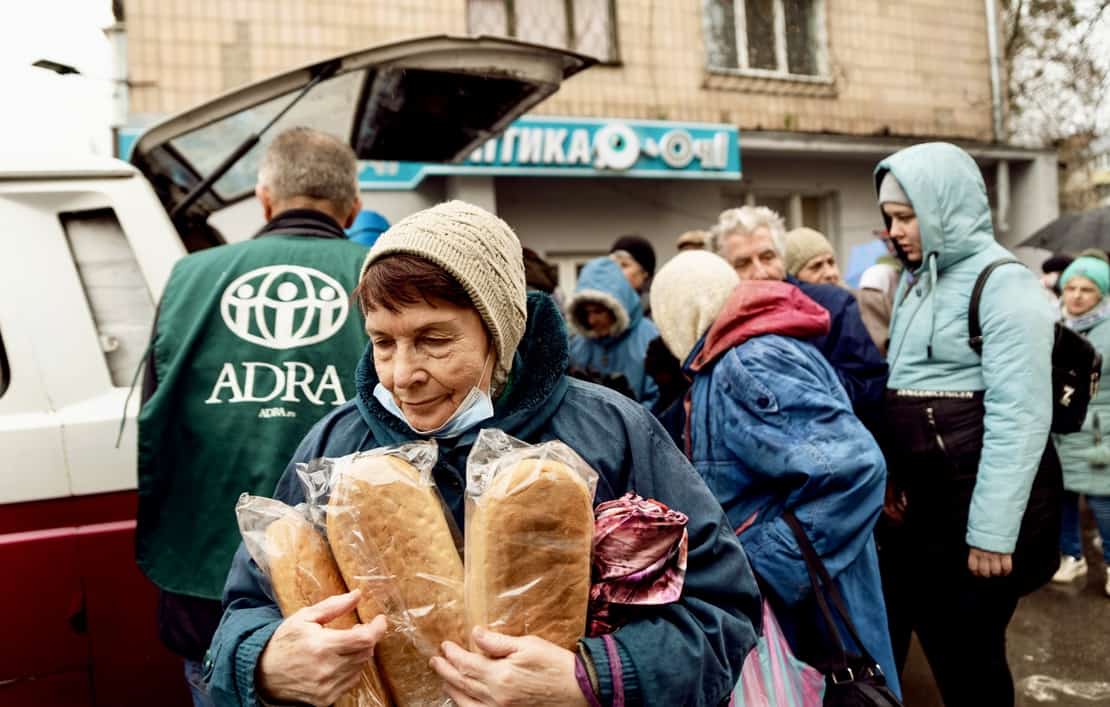
The Adventist Development and Relief Agency (ADRA) continues to deliver humanitarian aid to support the people of Ukraine a year after the armed conflict displaced millions of civilians in the Eastern European nation.
Since the start of hostilities on February 24, 2022, ADRA has launched a global response to assist the tens of thousands of families and individuals who have fled their homes to escape shelling and sought refuge in neighboring countries.
According to the United Nations, more than 8 million people have been forced to flee Ukraine in the past year, and another 18 million require humanitarian assistance within the country.
“We pray for those who have been separated from the people they love and the lives they know,” ADRA president Michael Kruger said. “We pray for those who have sought safety in bomb shelters and across foreign borders. We pray for those who have lost their homes and their sense of safety. We pray for those who hurt and those who serve. We pray for peace.
“Even as we pray for the end of this conflict, ADRA reaffirms its commitment to the people affected by it,” Kruger continued. “Our dedicated staff in Ukraine and across Europe have been providing urgent support since the earliest days of this crisis, and we are grateful for the partners, donors, and supporters who have helped make it possible to continue serving.”
Humanitarian assistance and volunteers
ADRA has provided nearly US$40 million in humanitarian assistance over the past year to support emergency response operations and development initiatives in communities impacted by the ongoing crisis. It has also activated more than 5,000 church volunteers, mobilized dozens of emergency response teams, and deployed multiple convoys to evacuate and transport more than 60,000 people from the war-torn region, as well as deliver food and life-saving supplies.
“ADRA was there before the crisis and will be there after the crisis,” Mario Oliveira, director of emergency response management for ADRA International, said. “It has been an enormously complex relief operation. No one expected to be in this situation a year later, but our humanitarian response has been possible because of the huge willingness to help from everyone in our ADRA global network, our church community and supporters, and the thousands of volunteers who stepped up.
“Unlike other disasters such as earthquakes and hurricanes, this emergency is still ongoing and changing on a daily basis. As a result, we tailor our response to the needs in Ukraine and border countries, where ADRA has been assisting refugees since the beginning of the conflict.”
The global humanitarian organization continues to lead relief efforts to assist displaced men, women, children, the elderly, and people with disabilities both inside and outside Ukraine, including food, water, essential supplies, multipurpose cash assistance, and vouchers for immediate needs; shelter and basic reconstruction of accommodations; and humanitarian evacuations and transports. The agency is also providing water trucking services and hygiene kits; winterization projects that can provide heat and energy as well as generators to displaced communities; and psychosocial support and mental health for adults and children.
ADRA is also offering children’s camps, art therapy programs, and education initiatives; protection for women and children in conflict zones; medical check-ups for refugees and internally displaced persons; medical equipment, medications, and supplies for hospitals, and clinics; and rental assistance, as well as legal advice. Finally, the agency is also offering language classes to help refugees integrate into new communities and centers that help refugees find work in new labor markets.
Partnerships and collaboration with multiple partners is ongoing with the Adventist Church, United Nations offices, government agencies, and faith-based organizations.
The original version of this story was posted by the Adventist Development and Relief Agency.